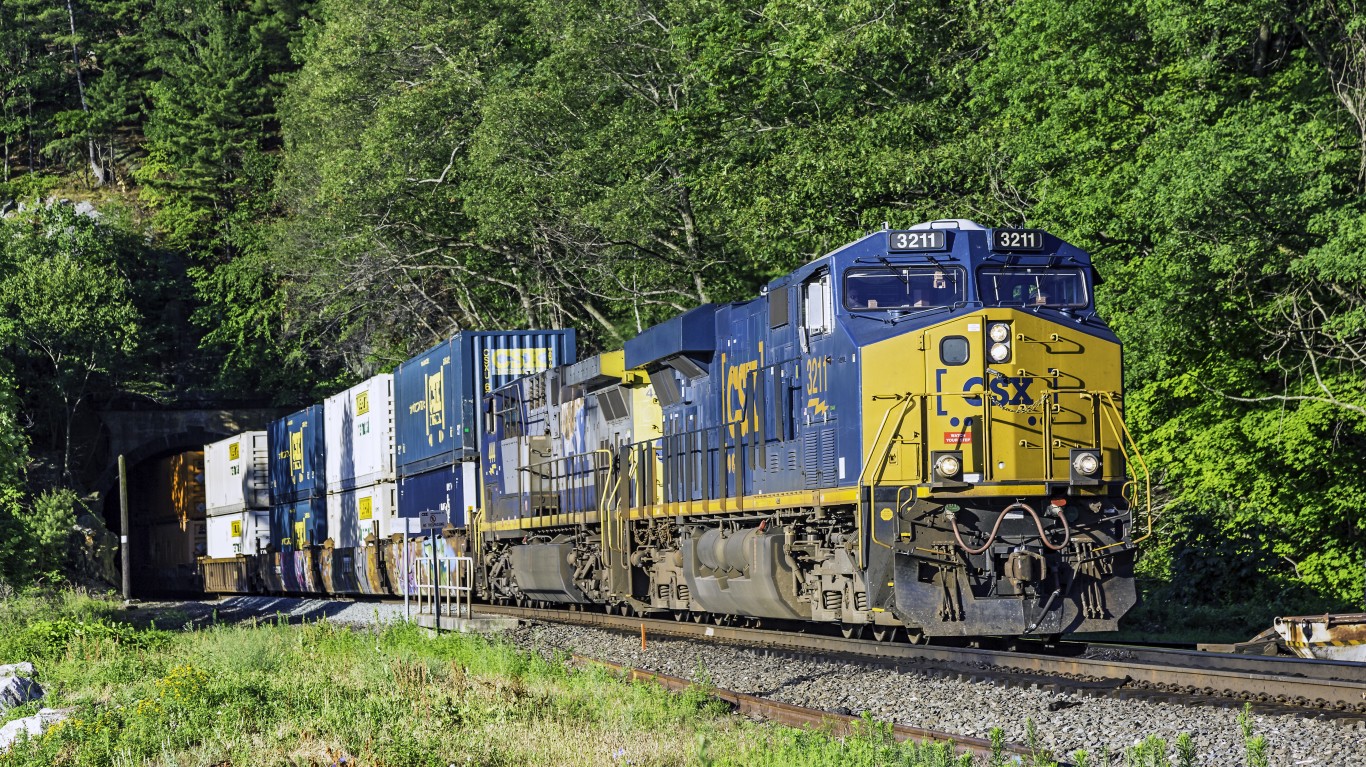
In the board game Monopoly, many players find railroads to be a safe, steady bet. But is that true in the real world, where the coronavirus outbreak has depressed shipments and the trucking industry is fighting for market share?
Consider CSX Corp. (NASDAQ: CSX). The Jacksonville, Fla.-based rail operator reported that first-quarter net income dipped by 8% to $770 million. But the company claims its operating ratio of 58.7% is an industry record best for the first quarter. A railroad’s operating ratio is nothing more than total expenses divided by revenue. Expenses dropped by 7% in the first quarter, a higher rate than the 5% dip in revenue.
CSX stock climbed in April after those first-quarter earnings results. The stock price is up 3.86% for the last month, though down about 12% year to date.
Analysts’ price target for CSX is $71.23, with a high estimate of $84.00. The current consensus rating is Buy after quite a few analysts boosted the price target in recent weeks.
Dealing with COVID-19
The coronavirus has hit the rail industry hard. Total carload shipments were down 25.2% in April from the year-ago period, according to the Association of American Railroads. Shipments of coal, autos and chemicals were all down, while farm product shipments were a bright spot, up 29%.
It “was the worst decline for total carloads for any month since our records begin in 1989,” said AAR Senior Vice President John T. Gray. Shipments of intermodals (shipping containers and truck trailers) dropped 17.2% for the month, the worst decline since the summer of 2009. “Coal and autos were by far the worst-hit commodities in April, but declines spanned the industrial spectrum, hitting finished steel and steel scrap, chemicals, petroleum products, sand and stone, and much else,” Gray said.
CSX felt the auto industry’s slowdown after manufacturing plants across America closed this spring. The company manages distribution and storage facilities for automobile companies.
Still, in a shareholders virtual meeting last week, CEO Jim Foote said CSX is on “solid footing” going forward. “CSX entered 2020 with historically strong free cash flow and a record-setting operating ratio for a Class I U.S. railroad,” Foote said. The company is “confident about our ability to scale up when the economy rebounds.”
The coronavirus pandemic may even present some long-term opportunities for railroads. The shutdown has left some American businesses without crucial supplies, which could lead to a shift in domestic production. For example, government policymakers may push for more American-made medicines and medical supplies, including personal protection equipment (PPE).
“I think that there will be more manufacturing that takes place in this country and any kind of business activity like that is good for the railroad,” Foote said in the Q1 earnings call back in April. And if American e-commerce businesses scale up, they could reach product volumes that make railroad shipping more attractive when compared with trucking (which is more suited for smaller volumes).
The rail industry was under pressure before the pandemic hit, particularly from declining use of coal. “Coal was by far the biggest source of U.S. rail carload decline in 2019, falling 9.2% … from 2018,” Gray said. Railroad shipments of coal peaked in 2006.
And there is always competition from America’s trucking industry. Trucks move 70.2% of total domestic tonnage, according to the American Trucking Associations. The group said tonnage increased 3.3% in 2019.
CSX Focuses on Efficiency and Cash
CSX says it has concentrated on improving efficiency for the last three years, which will help in the current environment. Total operating expenses dropped by 7% in the first quarter.
Fuel efficiency has been another big initiative. The company reported reduced annual diesel consumption of approximately 60 million gallons. “The emissions avoided from this reduction are the equivalent of planting almost one million acres of forest each year,” Foote said. Of course, reduced business naturally means lower fuel costs.
Saving cash is clearly of benefit right now. “We have ensured our cash position is liquid and available, shifting the majority of our cash investment to safer government funds for the time being,” CFO Kevin S. Boone said a few weeks ago. The company also raised an incremental $500 million of debt.
“You can also imagine we have run quite a few scenarios over the past several weeks,” Boone said. “Every model we run has us with substantial liquidity, emerging in a stronger position from this downturn and leveraging the subsequent recovery.”
For Wall Street, CSX has committed to continuing its stock buyback and dividend programs. “We’re generating significant free cash flow even in these market conditions and we can cover that dividend,” Boone said. “And we continue to be committed to shareholder returns.”
Last week, the CSX board approved a $0.26 per share quarterly dividend on the company’s common stock. The dividend is payable June 15.
Is Your Money Earning the Best Possible Rate? (Sponsor)
Let’s face it: If your money is just sitting in a checking account, you’re losing value every single day. With most checking accounts offering little to no interest, the cash you worked so hard to save is gradually being eroded by inflation.
However, by moving that money into a high-yield savings account, you can put your cash to work, growing steadily with little to no effort on your part. In just a few clicks, you can set up a high-yield savings account and start earning interest immediately.
There are plenty of reputable banks and online platforms that offer competitive rates, and many of them come with zero fees and no minimum balance requirements. Click here to see if you’re earning the best possible rate on your money!
Thank you for reading! Have some feedback for us?
Contact the 24/7 Wall St. editorial team.
